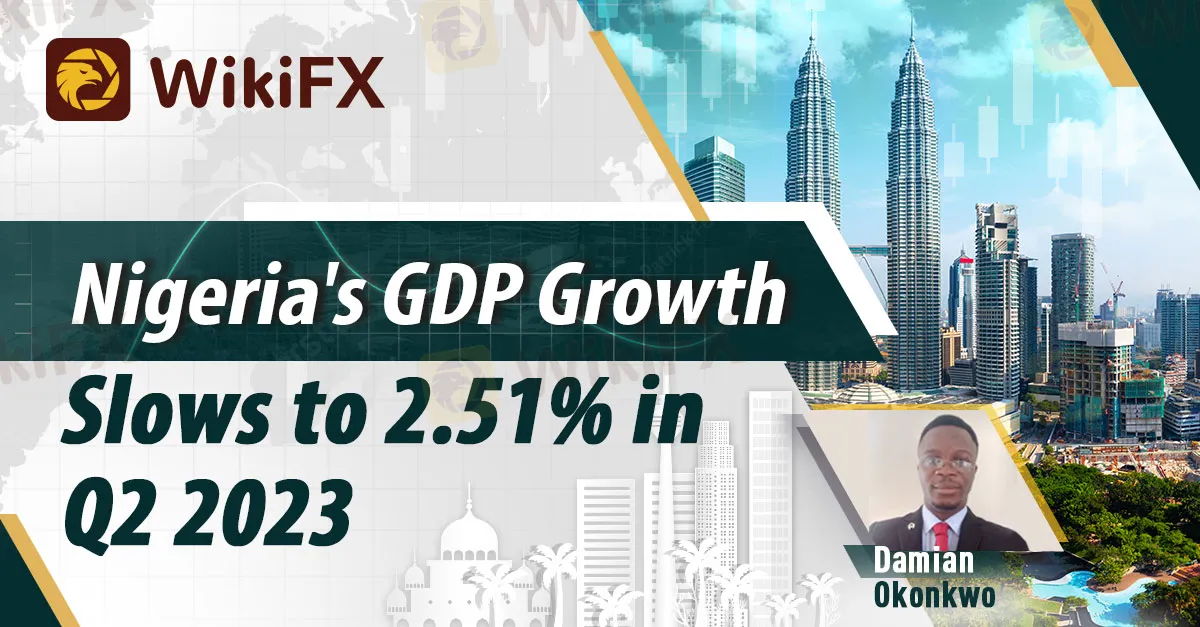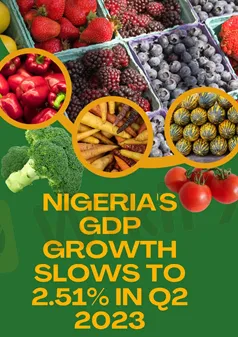简体中文
繁體中文
English
Pусский
日本語
ภาษาไทย
Tiếng Việt
Bahasa Indonesia
Español
हिन्दी
Filippiiniläinen
Français
Deutsch
Português
Türkçe
한국어
العربية
Nigeria's GDP Growth Slows to 2.51% in Q2 2023
Abstract:Nigeria's GDP slowed to 2.51% in the second quarter of 2023, down from 3.54% in the same quarter of 2022. This marked the lowest growth rate in Nigeria since the third quarter of 2020.

By: Damian Okonkwo

Abuja, Nigeria - Nigeria's gross domestic product (GDP) growth slowed to 2.51% in the second quarter of 2023, down from 3.54% in the same quarter of 2022, according to the National Bureau of Statistics (NBS).
This marked the lowest growth rate in Nigeria since the third quarter of 2020. The high level of decline witnessed in the country's GDP growth rate has been attributed to many factors, including:
● The removal of fuel subsidies in Nigeria in June, which has increased the cost of living for households.
● A weak currency, which has made it more expensive to import goods and services.
● A high level of debt, which is putting a strain on the government's finances.
● A lack of investment, which is hindering economic growth.
● A poor infrastructure, which is making it difficult to do business in Nigeria.
● The ongoing war in Ukraine, which has disrupted global supply chains and caused commodity prices to rise.
In addition to these factors, the Nigerian economy is also facing many other challenges, including:
● Security crisis, which is disrupting economic activity in some parts of the country.
● An increasing population with scarce resources.
● Climate change, which is causing more extreme weather events and making it more difficult to produce food.
The government has taken some steps to address the economic slowdown, including raising interest rates and devaluing the naira. However, these measures seem to have put more pressure on the economy, with more businesses folding up due to the high cost of borrowing.
Analysts are divided on the outlook for the Nigerian economy in the coming months. Some believe that the economy will continue to slow, while others believe that it will start to recover in the second half of the year.
The current economic slowdown has increased the hardship in the country, and the government is expected to take more urgent action to address the challenges facing the country.
The government can consider many measures to stimulate economic growth, including:
● Investing in infrastructure, such as roads, railways, and power plants.
● Promoting exports and attracting foreign investment.
● Reforming the education and healthcare systems.
● Working to improve the security situation in Nigeria.
The government also needs to work with the private sector to develop a plan for economic growth. The private sector is the engine of growth in any economy, and the government needs to create an environment where businesses can thrive.
Conclusion
The Nigerian economy is facing many challenges, but there are also growth opportunities. If the government takes the right steps, the economy could start to recover in the second half of the year. However, the situation could get worse if the government fails to take urgent measures to redeem the present economic distress in the region.

Disclaimer:
The views in this article only represent the author's personal views, and do not constitute investment advice on this platform. This platform does not guarantee the accuracy, completeness and timeliness of the information in the article, and will not be liable for any loss caused by the use of or reliance on the information in the article.
Read more

Alleged Concerns with TradeEU.global's Trading Practices
An individual trader has come forward with allegations of an unfavourable experience while using the services of the broker TradeEU.global.

Lured by False Promises: Malaysian Driver Lost RM218K to an Investment Scam
A 49-year-old e-hailing driver in Malaysia fell victim to a fraudulent investment scheme, losing RM218,000 in a matter of weeks. The scheme, which falsely promised returns of 3 to 5 per cent within just three days, left the individual financially devastated.

Italian Regulator Warns Against 5 Websites
The Italian regulator, CONSOB has issued a warning against five websites offering unauthorized financial services. This regulatory action aims to protect the public from fraudulent activities.

Trader Exposes Unethical Practices by STP Trading
A recent allegation against STP Trading has cast doubt on the firm's business practices, highlighting the potential risks faced by retail traders in an increasingly crowded and competitive market.
WikiFX Broker
Latest News
Saxo & Portuguese Bank Partnership
SEC Fines Broker-Dealers $275K for Incomplete SAR Filings
Lured by False Promises: Malaysian Driver Lost RM218K to an Investment Scam
FTX Sets March 2025 Timeline for Creditor Payouts: What It Means for Investors
What is an Economic Calendar? How it works
Italian Regulator Warns Against 5 Websites
SFC Freezes $91M in Client Accounts Amid Fraud Probe
Bybit Launches Gold & FX Treasure Hunt with Real Gold Rewards
Mastercard's 2030 Vision: Biometric-Driven, Tokenized Payments
What Are the Latest Trends and Strategies in Philippine Gold Trading?
Currency Calculator



